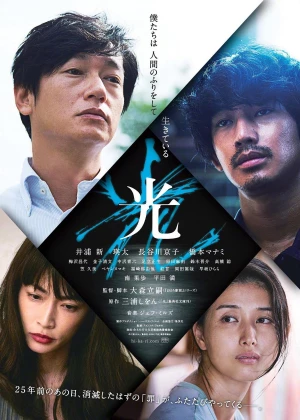And Then There Was Light

Tatsushi Ohmori is one of those directors who constantly flicker in and out of the international spotlights, making it exceedingly difficult to keep track of his oeuvre. And Then There Was Light [Hikari] is one of Ohmori's more recent films that didn't make it beyond the Japanese borders. While I get this isn't the easiest sell (not even to people who love the darker/crazier side of Japanese cinema) it is a film that dares to be different. A project like this should always be able to prove its worth on an international stage, sadly distributors aren't natural risk-takers so tracking it down will be no easy task.
![screen capture of And Then There Was Light [Hikari]](/thumbs/img/articles/1200xauto/and-then-light-1.webp)
Ohmori made a name for himself when he directed The Whispering of the Gods, one of the darkest, most relentless dramas I've ever come across. It's not a film that came to define Ohmori though. While almost all his films can be labeled as drama, throughout his career he has explored various niches within the genre and has made them all his own. It's clear that Ohmori is a very gifted director, but his skill shines brightest when he decides to diverge from the norm and make something that actively challenges people's expectations.
And Then There Was Light reminded me of a mix between Mipo Oh's The Light Shines Only There and films like Rage and Villain. Dramas with uncomfortable subjects, rougher stylistic edges and fractured characters, often spruced up with strong thriller elements. These films don't care much for subtlety, instead they sizzle with anger and resentment and lash out whenever they feel like it. This might come as a shock to those who expect to see a Koreeda derivative, but I generally quite like this uprooting of the otherwise so quiet and respectful Japanese dramas.
The film revolves around three kids whose lives are violently disrupted when a tsunami hits the small island they live on. After the dust has settled they're shipped off the mainland, where they grow up separate from each other. 25 years later fate brings them back together, but life hasn't been kind to them and their reunion isn't a happy one. The past has left behind some considerable scars and when long forgotten secrets are dragged up a mean struggle for survival begins. One where old childhood bonds are broken and abused without the least bit of remorse.
![screen capture of And Then There Was Light [Hikari]](/thumbs/img/articles/1200xauto/and-then-light-2.webp)
Visually And Then There Was Light stayed well within my expectations. The cinematography is pretty polished, just a tiny bit rawer than your average Japanese drama. The color palette favors slightly darker colors, the camera work is just that little more vibrant and the editing a smidgen sharper than usual. Ohmori picks his moments to make sure it doesn't turn too depressing and/or sullen, which provides a nice contrast and results in a handful of scenes that manage to stand out. Generally speaking though, this is not a film you'll remember as an outstanding visual tour de force.
The soundtrack on the other hand is insane. The film opens with a shot of a ferry sailing away from the coastline, if you're familiar with (Japanese) dramas you can pretty much dream up the piano/string score that would normally go along with it. But not here. Ohmori commissioned Detroit techno pioneer Jeff Mills to handle the score, who opens the film with banging 90s-inspired rave music. Truthfully, this pairing makes no sense whatsoever, something Ohmori uses this to his full advantage, pulling the rug from under the audience's feet as to create a feeling of discomfort and uncertainty. It may seem random at first, but there's a method to the madness. I love it when directors make brave soundtrack choices and this is one of the best examples I've come across. Exemplary.
The cast is solid across the board. There are no real stand-out performances, nor are there obvious weak links. This goes for both the primary and secondary actors. A film like this doesn't call for subtlety, something the cast realized all too well, as they trample across the screen to give their most spirited performances. There's a certain underlying rage and frustration there that goes very well with the vibe Ohmori chases. I don't think I'll end up remembering any specific performances, but the cast as a whole did a commendable job.
![screen capture of And Then There Was Light [Hikari]](/thumbs/img/articles/1200xauto/and-then-light-3.webp)
And Then There Was Light is in many ways a reversal of an archetypical Japanese drama. Characters aren't very friendly or respectful, dramatic reveals and baffling actions keep pulling the story in different directions and subtlety is scrapped in favor of a more primal experience. Characters' actions are directed by an inability to deal with the unfair cards life dealt them, and as such lack the logic one would expect from people in a sober, composed state of mind. It's completely different from how you normally experience a Japanese drama (which tend to be soothing and comforting), but that's what makes this film so interesting.
I'd say this is a film for more seasoned fans of Japanese drama, particularly ones who can appreciate a darker, less refined approach. In spirit, it's a film much closer to the work of Shinya Tsukamoto or Gakuryu Ishii, stylistically it's more in line with traditional drama. That creates a very interesting tension which Ohmori knows to exploit to its core. Disagreeable characters, dark drama, fitting cinematography and a completely mental soundtrack create an uncomfortable, unpredictable atmosphere that eats away at the audience. Whether you think that's worth your time is up to you, personally I was well impressed with And Then There Was Light.